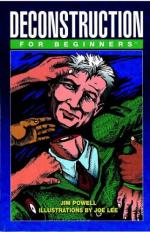|
This section contains 9,373 words (approx. 32 pages at 300 words per page) |

|
SOURCE: Cole, Steven E. “The Dead-end of Deconstruction: Paul de Man and the Fate of Poetic Language.” Criticism 30, no. 1 (winter 1988): 91-112.
In the following essay, Cole focuses on the critical theory of de Man, suggesting that his deconstruction of meaning in literature leads not to liberation from tradition, but to a logical dead end.
1.
Perhaps no contemporary theorist is more difficult to analyze than Paul de Man, although the difficulties are not precisely what his admirers have supposed. In the flood of commentary which has appeared since his death (and this is true even of Jacques Derrida's remarkable Memoires1), one finds less analysis than a kind of mimetic homage in which the acolyte gestures mysteriously at texts whose profundity is insured by their resistance to comprehension. Thus, in a memorial volume of essays, we are told that de Man “will also teach us, once again, in his own...
|
This section contains 9,373 words (approx. 32 pages at 300 words per page) |

|


